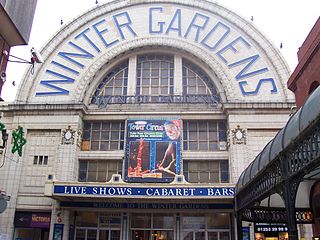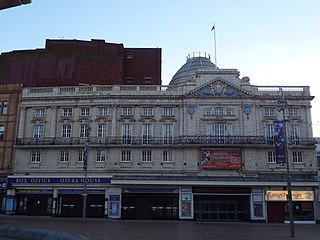Chelsea or Chelsey may refer to:

Joseph McLaughlin, known professionally as Josef Locke, was an Irish tenor. He was successful in the United Kingdom and Ireland in the 1940s and 1950s.

Blackpool is a seaside town in Lancashire, England. It is located on the Irish Sea coast of the Fylde peninsula, approximately 27 miles (43 km) north of Liverpool and 14 miles (23 km) west of Preston. It is the main settlement in the borough of the same name. The population of Blackpool at the 2021 census was 141,000, a decrease of 1,100 in ten years.
The Alhambra is a palace in Granada, Spain.
Nero was the Roman emperor from 54 to 68 AD.
A revolution is a drastic political change that usually occurs relatively quickly. For revolutions which affect society, culture, and technology more than political systems, see social revolution.
Theatre Royal may refer to:
Metropolitan may refer to:
Ritz or The Ritz may refer to:

Craig Revel Horwood is an Australian-British author, dancer, choreographer, conductor, theatre director, and former drag queen in the United Kingdom. He is also a patron of the Royal Osteoporosis Society.

Trevor Edward Peacock was an English actor and songwriter. He made his name as a theatre actor, including for his roles in Shakespeare. He later became known for playing Jim Trott in the BBC comedy series The Vicar of Dibley.
A lighthouse is a tower aiding marine navigation.

The Winter Gardens is a large entertainment complex in Blackpool, Lancashire, England, which includes a theatre, ballroom and conference facilities. Opened in 1878, it is a Grade II* listed building, operated by Blackpool Entertainment Company Limited on behalf of Blackpool Council, which purchased the property from Leisure Parcs Ltd as part of a £40 million deal in 2010.

Daniel J Whiston is an English ice skater. He appeared in Strictly Ice Dancing on BBC One in 2004 and for all series of ITV show Dancing on Ice since its inception in 2006. He won the first series of Dancing on Ice while partnering actress Gaynor Faye, the fifth series with former Emmerdale actress Hayley Tamaddon and the eighth series with Olympic artistic gymnast, Beth Tweddle. Since 2019, Whiston has been Associate Creative Director of Dancing on Ice responsible for creating all professional routines and training all celebrity contestants.
Ian Bartholomew is a British actor and musician from Portsmouth, England who has worked widely in both theatre and television. In March 2018, Bartholomew joined the cast of ITV soap opera Coronation Street, as Geoff Metcalfe. He also played Chitterlow in the revival cast of Half A Sixpence alongside Charlie Stemp, who played Arthur Kipps, and the Baker in the original West End production of Into the Woods opposite Imelda Staunton as his wife.
Jodie Christine Prenger is an English actress and singer, best known for winning the second series of The Biggest Loser in 2006 and the BBC talent show I'd Do Anything in 2008, the latter of which subsequently launched her career in theatre. In 2022, she began portraying the role of Glenda Shuttleworth in the ITV soap opera Coronation Street.
A studio is an artist's or worker's work room.

Sylvia Cecil was an English singer and actress. She began her career in the Gilbert and Sullivan operas with the D'Oyly Carte Opera Company, with whom she performed, off and on, from 1918 until 1937. She also performed in musical theatre, concerts, music hall and variety from 1921, and broadcast on radio. In the 1940s and 1950s she starred in several musicals by Ivor Novello and Noël Coward.

The Opera House Theatre is a theatre in Blackpool, Lancashire, England. It is located within the Winter Gardens, a large entertainment complex in the town centre and originally opened in 1889, although it has been rebuilt twice, in 1910 and 1939.
This page is based on this
Wikipedia article Text is available under the
CC BY-SA 4.0 license; additional terms may apply.
Images, videos and audio are available under their respective licenses.







